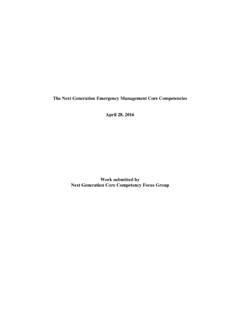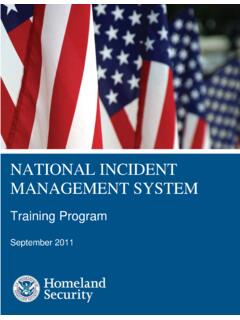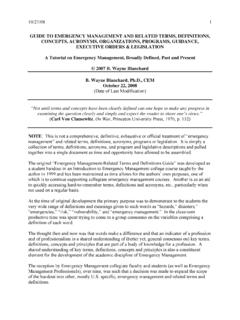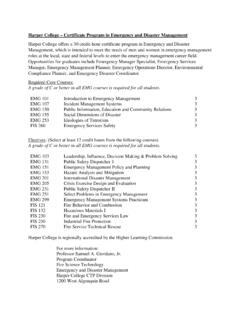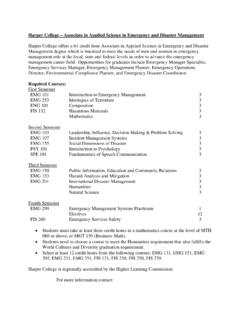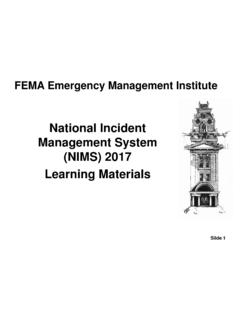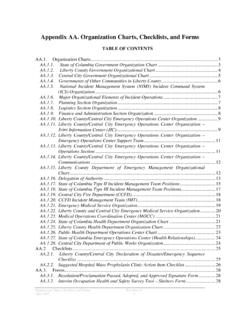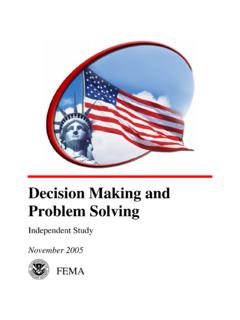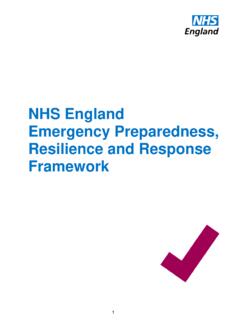Transcription of LEARNING MORE ABOUT THE EMERGENCY MANAGEMENT …
1 LEARNING MORE ABOUT THE EMERGENCY MANAGEMENT PROFESSIONAL FEMA Higher Education Program Prepared by David A. McEntire, PhD Dean, College of Health and Public Service Utah Valley University January 2018 INTRODUCTION Want to learn more ABOUT the EMERGENCY MANAGEMENT professional and work in this important area? Congratulations! You are ABOUT to enter one of the most important, dynamic and rewarding careers in the United Stated and around the world! The EMERGENCY MANAGEMENT profession is vital since disasters are increasing in frequency and intensity. In addition, the profession is ever-changing since hazards and vulnerabilities are changing over time and because the methods to deal with them are improving as well.
2 And, the profession is satisfying since it provides countless benefit toward the well-being of society. Perhaps you have questions ABOUT this particular career and how to become a professional in EMERGENCY MANAGEMENT . This is understandable and perfectly normal. EMERGENCY MANAGEMENT is a relatively new and complex profession. Therefore, most people struggle to comprehend the vast array of options for employment. And, even fewer people understand professional roles within the unique but complex nature of EMERGENCY MANAGEMENT . For these reasons, it is important to finds ways to facilitate and improve entry into this profession and help individuals launch and advance their careers.
3 The Department of Labor periodically generates an Occupational Outlook Handbook to help answer general inquiries ABOUT employment. This document describes various aspects of many careers, including EMERGENCY MANAGEMENT (DOL 2016-17). Quick Facts ABOUT a very specific position in EMERGENCY MANAGEMENT EMERGENCY MANAGEMENT Directors are shown in the chart below. DOL EMERGENCY MANAGEMENT Director Quick Facts 2016 Median Pay $70,500 per year ($ per hour) Typical Entry-Level Education Bachelor s Degree Work Experience in a Related Occupation 5 years or more On-the-job Training None Number of Jobs, 2014 10,500 Job Outlook, 2014-24 6% (as fast as average) Employment Change, 2014-24 700 This information provides a useful glimpse into one very specific career in EMERGENCY MANAGEMENT .
4 But, it does not tell the whole story ABOUT this profession. There are many other wonderful career options in EMERGENCY MANAGEMENT . And, because the chart is limited, the details are incomplete and perhaps even unintentionally misleading. For instance, there is certainly on-the-job training for those working in EMERGENCY MANAGEMENT and there are more people employed in this area than EMERGENCY Managers alone. For this reason, it is important that you undertake a more thorough examination of EMERGENCY MANAGEMENT to see if this type of employment is the right choice for you.
5 In the following document, you will find answers to significant questions: What is EMERGENCY MANAGEMENT ? Who works in EMERGENCY MANAGEMENT and what do they do? What is the job of EMERGENCY MANAGEMENT like? What career options exist? What do those employed in EMERGENCY MANAGEMENT make? How do I become an EMERGENCY MANAGEMENT professional? How can I advance my career in EMERGENCY MANAGEMENT ? The goal of this document is to help you find answers to these significant inquiries. In so doing, you will be better prepared to enter and contribute to the vital EMERGENCY MANAGEMENT profession.
6 MODULE 1: WHAT IS EMERGENCY MANAGEMENT ? Emergencies and Disasters Each day, there are countless emergencies and disasters in the United States and elsewhere around the world. On occasion, there are more significant catastrophes and calamities that have an even greater impact on individuals, organizations and societies. These events may result from natural, technological or anthropogenic hazards such as earthquakes, tornadoes, hurricanes, wildfires, industrial explosions, chemical releases, transportation accidents or terrorist attacks. When these hazards interact with vulnerable people and fragile infrastructure, t hey result in injury, death, damage and disruption.
7 Important Terminology Emergencies small scale disasters with limited impacts. Disasters deadly, destructive and disruptive events that occur when a hazard interacts with human vulnerability. Catastrophes/Calamities large scale disasters with extensive impacts. Natural hazards triggering agents produced by earth systems, such as the atmosphere, geological, hydrological, seismic, etc. Technological hazards triggering agents resulting from technology, such as petro-chemical facilities, power plants, computer networks, etc. Anthropogenic hazards triggering agents generated by people, such as a transportation accident, mass shooting, terrorist bombing, etc.
8 Vulnerability EMERGENCY MANAGEMENT In order to be ready for such devastating events, the profession of EMERGENCY MANAGEMENT is desperately needed. EMERGENCY MANAGEMENT can be defined as an effort to plan how to deal with disasters in the most effective manner. Nevertheless, there is far more to EMERGENCY MANAGEMENT than meets the eye. There is no single, agreed-upon conceptualization of EMERGENCY MANAGEMENT . Many scholars and government agencies have developed their own definition for the term. On the academic side, scholars have defined EMERGENCY MANAGEMENT from a disciplinary perspective: EMERGENCY MANAGEMENT is the discipline dealing with risk and risk avoidance.
9 (Haddow and Bullock 2003, 1). EMERGENCY MANAGEMENT is the study of how humans and their institutions deal with hazards, vulnerabilities and the events that result from their interaction (Jensen, 2013). EMERGENCY MANAGEMENT has also been defined from a professional orientation or in terms of practical application. The following are common examples of these types of definitions: In simplest terms, EMERGENCY MANAGEMENT is the MANAGEMENT of risk so that societies can live with environmental and technical hazards and deal with the disasters that they cause (Waugh 2000, 3) EMERGENCY MANAGEMENT is the.
10 Profession of applying science, technology, planning, and MANAGEMENT to deal with extreme events that can injure or kill large numbers of people, do extensive damage to property, and disrupt community life (Drabek and Hoetmer 1991, xvii). EMERGENCY MANAGEMENT is An ongoing process to prevent, mitigate, prepare for, respond to, maintain continuity during, and to recover from an incident that threatens life, property, operations, or the environment (NFPA 1600). Probably the most well-known definition of EMERGENCY MANAGEMENT comes from the FEMA EMERGENCY MANAGEMENT Focus Group.
